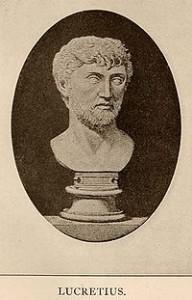It is nice to see Lucretius finally getting his due. In The Swerve: How The World Became Modern, Stephen Greenblatt pays homage to the Roman poet (and his Greek predecessor Epicurus). A few years ago, I was thinking about the history of religious critiques and sketched these notes:
While it would be tempting to date the first skeptical interrogation of — and explanation for –- religion to the Scottish Enlightenment philosopher David Hume (1711-1776 CE), we can trace it further back in time to Epicurus (340-270 BCE) and Lucretius (circa 50 BCE). Presaging Hume, Epicurus developed an empirical theory of knowledge based on the senses; he “believed that, on the basis of a radical materialism which dispensed with transcendent entities such as the Platonic Ideas or Forms, he could disprove the possibility of the soul’s survival after death, and hence the prospect of punishment in the afterlife” (Konstan 2009). Although Epicurus did not flatly dispute the existence of the Greek gods, he suggested they were chimerical thought-constructs that served a moral purpose.
Two centuries later, Lucretius advanced these arguments in his poem On the Nature of Things. While Lucretius is little remembered today, his thinking was far ahead of its time:
Lucretius envisages how life first emerged from the earth, and how humans developed from nomadic hunters to city-dwellers with language, law and the arts. In this prehistory the exclusion of divine intervention, while rarely foregrounded, is plainly the underlying motivation. The fertile young earth naturally sprouted with life forms, and the organisms thus generated were innumerable random formations. Of these, most perished, but a minority proved capable of surviving – thanks to strength, cunning, or utility to man – and of reproducing their kind. This account, which has won admiration for its partial anticipation of Darwin’s principle of the survival of the fittest, is plainly using a kind of natural selection to account non-teleologically for the apparent presence of design in the animal kingdom.
Much the same anti-teleological program underlies the ensuing prehistory of civilization. Each cultural advance was prompted by nature, and only subsequently taken up and developed by human beings. Hence, it is implied, no divine intervention need be postulated as an explanatory tool. No Prometheus was needed to introduce fire, which rather was first brought to human attention by naturally kindled forest fires. Language emerged because people started to notice how their instinctive vocal responses to things, comparable to animal noises, could be put at the service of their intuitive desire to communicate (for which infants’ pre-linguistic pointing is cited as evidence). The [book] is rich in other cultural reconstructions, including the origin of friendship and justice in a primitive social contract, and of conventional religion in early mankind’s misguided tendency to link visions of the gods, above all in dreams, to their desire to explain cosmic phenomena.
[In conclusion], Lucretius works through a range of the phenomena that physical theorists were standardly called upon to account for: storms, waterspouts, earthquakes, plagues and the like. Once more the exclusion of divine causation undoubtedly motivates the account, the phenomena in question being nearly all ones popularly regarded as manifestations of divine intervention. Lucretius not only explains them naturalistically, but is ready to mock the rival, theological explanations: for example, if thunderbolts are weapons hurled by Zeus at human miscreants, why does he waste so much of his ammunition on uninhabited regions, or, when he does score a hit, sometimes strike his own temple? (Sedley 2008).

Greenblatt and I clearly got the same memo on Lucretius and I look forward to reading his book.
References:
Konstan, David. 2009 (Spring). “Epicurus,” The Stanford Encyclopedia of Philosophy, Edward N. Zalta (ed.), URL = <http://plato.stanford.edu/archives/spr2009/entries/epicurus/>.
Sedley, David. 2008 (Fall). “Lucretius,” The Stanford Encyclopedia of Philosophy, Edward N. Zalta (ed.), URL = <http://plato.stanford.edu/archives/fall2008/entries/lucretius/>.


